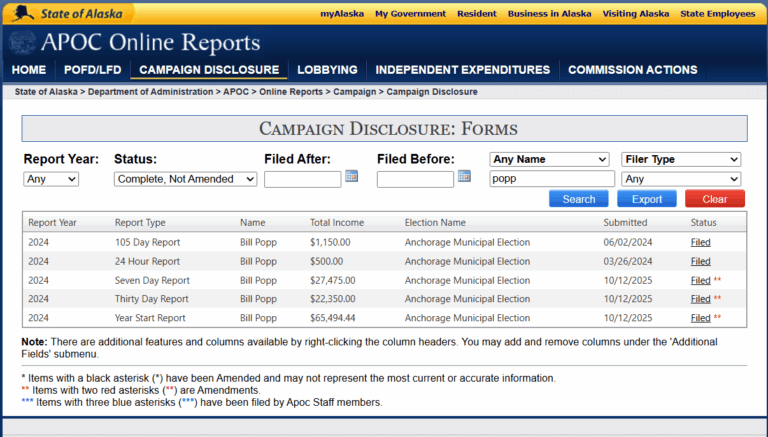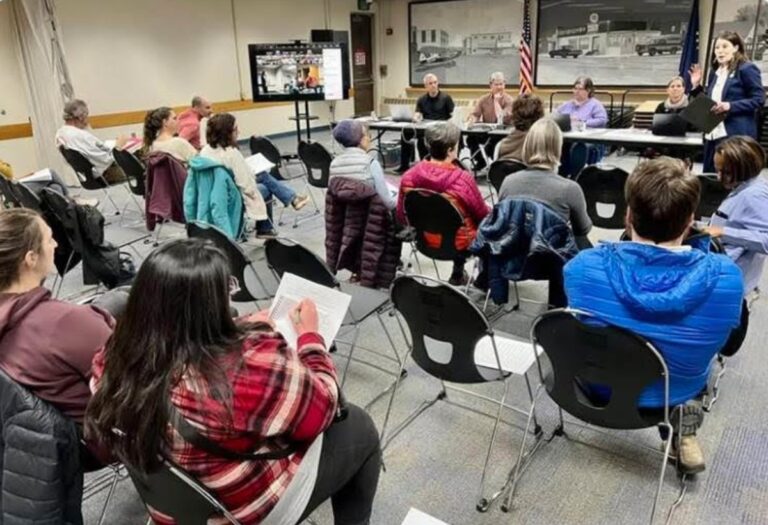Editor’s Note: This story was updated on 10/17/2025 to reflect the fact that State Senator Shelley Hughes is also running as a candidate for Governor.
Alaskans 4 Personal Freedom (AK4PF) held its “Break Free with Knowledge” conference this past Saturday, Oct 11. The conference featured a panel of experts who delivered presentations on topics ranging from bias in medical journalism to America’s farming crisis to AI’s impact on children. After presentations, AK4PF hosted a robust Q&A session.
The event was well attended, filling half of the Wendy Williamson auditorium. Among those in attendance were candidates for Governor Bernadette Wilson, Nancy Dahlstrom, and Shelley Hughes. State Reps. Jamie Allard and Kevin McCabe also attended.
If you missed the conference, you can still watch the recorded presentations, which will be posted to AK4PF’s website within the next couple of weeks. You can read the presenters’ bios here. This article provides a compilation of key points and quotes by each speaker:
Dr. Ilona Farr: “Updates in Medicine 2025”
According to Dr. Farr: “Bureaucrats control your health.” How? By shaping policies that place insurance company interest above patients’ interests. For example, Dr. Farr pointed to Dunleavy’s eliminating of the 80th percentile rule in 2023—a move that favors insurance agencies, lowers average income for family medicine physicians, and forces two-thirds of patients to pay out-of-pocket for medical care. Another example is bureaucrat control over Ivermectin. Dr. Farr’s personal experience and knowledge of scientific studies lead her to conclude that Ivermectin is 50-70% effective against cancer. She prescribes Ivermectin in combination with Mebendazole to her cancer patients and has seen firsthand an incredible rate of recovery among these patients. However, media continues to paint Ivermectin as ineffective and U.S. law prohibits overseas shipments of Ivermectin.
Mary Holland, J.D.: “Fighting for Justice: Health Freedom Legal Action”
Mary Holland covered a wide range of medical issues affecting our children. First, Holland exposed a possible profit-driven agenda that has intentionally increased the rate of chronic disease in American children. 54% of American children today have a chronic illness (whereas in 1988, it was only 12%). Holland blames this immense increase on pharmaceutical companies taking advantage of the lucrative health market. Second, Holland addressed the recent announcement by the Trump administration regarding Tylenol and Autism. She stated, “Autism is a complicated illness. It is likely caused by multiple environmental agents, not one factor. Possible factors include vaccines, poisons in our food and air, microplastics, radiation from 5G technology, and geoengineering.” She finished her presentation with a startling revelation regarding modern vaccines: “There is not a single vaccine on the federally recommended schedule that has been tested against an inert placebo.” Instead, these vaccines are being tested against older versions of the vaccines or completely different vaccines. This raises significant concerns as to the efficacy of modern vaccines.
Dr. Ryan Cole: “Be Your Own Best Doctor”
According to Dr. Cole: “Medicine and society have normalized the abnormal… We live in an era of wealth and hell-ness instead of health and wellness.” In fact, some medical schools no longer require medical professionals to take the Hippocratic Oath in which medical professionals swear “to do no harm.” With limited trustworthiness among today’s doctors, Dr. Cole recommends ways you can “be you own best doctor.” One important way is to make sure you get plenty of good light. Good sources of light are more important for your body than you may realize. According to Dr. Cole, human cells communicate through light waves, not only through biochemical reactions. This means we need healthy light (such as sunlight or high-quality light therapy lamps) for our cells to work properly. Because sunlight affects cellular communication, it helps manage obesity and supports mitochondrial function. Dr. Cole ended his presentation with a quote from Thomas Jefferson: “Those who expect to be both ignorant and free expect what never was and never will be.”
Dr. Pierre Kory: “The War on Ivermectin”
Dr. Kory stated: “We live in a world where they control the info-sphere.” Today’s medical journals are largely controlled by Big Pharma, who seeks the highest profit instead of scientific integrity. Dr. Kory highlighted the “Disinformation Playbook,” which was used 50 years ago by tobacco companies to convince consumers that tobacco is healthy or at least not damaging to health. This playbook is still being used today by profit-driven scoundrels that manipulate studies and media coverage to promote their products. For example, an Oxford study was conducted showing positive results for Ivermectin treating Covid. However, the actual report was published saying the study had negative results because of a “probability of clinical meaningfulness” factor that mathematically manipulated the results to be negative. Ketamine is another drug consistently stigmatized. However, Dr. Kory claims the drug is miscategorized and in small doses produces enormously positive results for patients with severe brain disfunction.
Dr. Meryl Nass: “The Attack on Farming, Food, and our Health”
Our farms and ranches are under attack in the U.S., claims Dr. Meryl Nass. For the last 5 years, the median farmer’s income was negative. The median American farmer loses $1,000-2,000 annually, forcing many farming families to rely on a second income. Since 2017, the U.S. has lost an average of 63 farms per day. With a high number of imports from Mexico (where farm workers earn an average of $2 an hour), U.S. farmers (who pay an average of $18 an hour) cannot stay competitive in the market. In 2022, the U.S. government introduced the Crop Insurance Program which cost taxpayers $17 billion ($50 from every American). But only 13% of farmers received crop insurance because many small farm owners did not qualify for government-supplied crop insurance and could not afford private crop insurance. Dr. Nass also talked about the crisis occurring among American ranchers. In 1970, ranchers received 70% of the profit from the sale of their meat. Today, ranchers only receive 30% after meatpackers and retail stores take their cut. Who is behind these attacks? According to Dr. Nass: “Globalist want our food system to fail.” She argues that globalists want to radically reinvent the food system in an effort to combat climate change.
Visit Save Our Food and Farms to see the 50 ways our farmers and food are under attack.
Dr. James Lindsay: “The Stakeholder Economy and its Threat to American Prosperity.”
Dr. Lindsay explained capitalism in a unique way: “Capitalism or Free Enterprise is nothing more than people solving other people’s problems without having to care about other people’s problems.” For example, a man can solve his own problem of feeding his family by creating 500 hammers and selling them. He is now solving 500 people’s problem of needing a hammer, but his initial motivation was to solve his own problem. Capitalism works because it appeals to the human tendency to be self-interested. However, Dr. Lindsay argued that our current American economy is being transitioned from a free market system to a system similar to the Nazi shareholder economy of the 1940s. The Nazis designed a system where free enterprise could exist, but only when it first served the best interests of the people. But who decides what is in the best interest of the people? The Nazi government, of course. Business owners were free, in a sense, to operate in the market and keep profits, but only after they contributed their fair share of money to the Nazi programs that claimed to seek the “greater good.” In this framework, production primarily serves the government rather than the individual’s self-interest.
Michael Ashley: “Outsourced Minds: AI’s Hidden Cost to Our Kids”
Reading good books helps kids develop empathy by putting readers in different characters’ shoes. Good writing ability helps kids learn how to process their thoughts and feelings externally, which has immense benefits on mental health. Michael Ashley’s message to kids is that using AI to cheat robs you of important soft skills you need to be a successful person both in the workplace and in your private life. Not only does AI tempt kids to take the easy way out, but according to Ashley, technological development is leading to brain chips. In fact, brain chips are already on the way. Elon Musk has patented the word “telepathy” and is developing a brain chip through his company Neuralink that allows people to control technology with only their brain. The new tech could “allow telepathic communication between individuals with Neuralink implants.” If this technology is allowed to run loose, what will society look like in 30 years? Ashley insists, “we need to tell our young people that it is ok to take the stairs. It is time to stop taking the easy way out.”
Leslie Hiner, J.D.: “The Federal Tax Credit Scholarship Program and School Choice Options”
According to NAEP scores, Alaskan children’s math and literacy skills are at an all-time low. According to the NAEP report, only 30% of Alaskan 4th graders and 22% of Alaskan 8th graders “performed at or above the NAEP Proficient level.” While the data certainly paints a dim picture, Alaska’s state government and the federal government are trying to boost Alaskan academic success through the Correspondence School Allotment Program and the Federal Tax Credit Program. Alaska’s Correspondence School Allotment Program is the first and only program of its nature in the U.S. The program reimburses families up to $4,500 per student for students enrolled in private schools. Trump also seeks education reform with his Big Beautiful Bill, part of which created the Federal Tax Credit program to help encourage donations to educational non-profits. Individuals can donate to a scholarship granting organization that supports a school of their choice – public, private, or religious-based – and receive the money back as a tax credit (up to $1,700 yearly). During the Q&A, Hiner was asked if the AK state constitution (which bans the use of public funds for religious education) contradicts the Federal Tax Credit program. She answered: “No. When [individuals] receive the money, the money becomes [their] money and no longer public funds.” This means individuals can donate to support religious-based education and receive up to $1,700 back in federal tax returns.
Split-the-Pot Helps Out Hope Center
During the conference, AK4PF also conducted a split-the-pot lottery fundraiser for the Downtown Soup Kitchen Hope Center. Hope Center helps homeless women gain life skills and get up on their own feet. They provide a safe place for homeless women where they can receive three meals a day, laundry and shower services, case management, and spiritual care. These women can choose to partake in Hope Center’s Feed My Hope Bakery Program, Feed Me Hope Culinary Program, or help out with the Feed Me Hope Food Truck. Delicious chocolate chip cookies made by Feed Me Hope were given out to attendees at the conference. The fundraiser raised $1,800, half of which went to Hope Center, and half went to one winner with the lucky ticket.
Natalie Spaulding, a 2025 Hillsdale College graduate, recently joined the Must Read Alaska team.










